
Gay at TU/e now visibly okay
LGBTQA+ emancipation: a retrospective
You can’t miss it: it’s Diversity Week. A rainbow flag is flying, the red of the TU/e logos has been changed to rainbow colors, and when it’s dark the letters on top of Vertigo light up in a rainbow pattern. But things weren’t always like this. This is a retrospective of homosexual emancipation at TU/e.
One of the first openly gay people at TU/e was Jan de Graaf. He recently passed away at the age of 82, after which these two beautiful In Memorias were published.
Many mathematicians are familiar with him. In spite of his stutter, he liked to teach and enjoy giving humorous speeches. When Jan de Graaf retired in 2007, he didn’t leave TU/e behind, far from it. The professor in the CASA cluster of Mathematics and Computer Science couldn’t let go of math and continued to visit TU/e every day for years. Colleague Mark Peletier tells us that he could always be found in a room for guests and emeriti on the seventh floor of MetaForum.
Jan de Graaf pioneered the emancipation of the homosexual communities in Eindhoven and at TU/e, still called the Technische Hogeschool (TH) Eindhoven at the time. In 2018, he looked back on his experiences as a gay man at TU/e. In Supremum magazine, published by GEWIS (the study association for Mathematics and Computer Science), he wrote ‘The very short history of gay life at TU/e’. In the 1960s, he had been active in both a catholic and an atheist group as a student. ‘Gay sex wasn’t talked about there, except in vague whispers when a fellow student had committed suicide.’
After birth control pills were invented in 1968, it didn’t take long for the heterosexual revolution to get underway, but media attention for homosexuality would be at least five more years in the making. In the second half of the 1970s, the TH-homogroep was founded. De Graaf wrote that it consisted of fifteen students and two or three staff members that would discuss books or films together. Two students and one staff member represented the Department of Applied Mathematics.
From 'De kleine encyclopedie van de TU/e'
From De Kleine TU/e encyclopedie: ‘In November 1967, a teach-in on sexuality was held, which instead of covering the medical aspects went into the ethical ones. Beforehand, students got the opportunity to watch the film ‘Seks is overal’ (Sex is everywhere) by Kees Brusse. Plenty of experts were present at the public debate that took place afterwards: a student psychologist, a moral theologian, a doctor, and an anthropologist delved into the subject matter.’
Due to lack of interest, the TH-homogroep existed for a mere five years. Ten years later, a female pastor associated to Het Humanistisch Verbond (humanist society) founded ‘1 op Tien’, wrote De Graaf. Rector Van Lint suggested not to fund this group, but it was, he adds. De Graaf visited the founding meeting and, in 2006, the official disbanding.
De Graaf mentioned two important organizations outside TU/e: COC and Roze Driehoek. He included a nice anecdote about the latter. One of his classes was attended by a male student in a dress and high heels, who knit a sweater out of a ball of pink wool (measuring more than half a yard across) using extremely long knitting needles. This was part of a hazing ritual for membership of Roze Driehoek. It caused little stir.
1 op Tien
In 1991, 1 op Tien was founded. There was a report on its five-year anniversary in Cursor. In those first years, the focus was on having fun and sharing information. The group wasn’t big, with ten to fifteen people attending the gatherings. This made 1 op Tien realize that the percentage of gay people within the TU/e community was probably lower than ten.
What program manager Ludo van Meeuwen remembers about 1 op Tien, is that the lunches it organized 'were hidden on the right hand-side of the Atlas basement'. He studied Technology and Society (the predecessor to Innovation Sciences) and Human Technology Interaction between 2001 and 2008, and came out in this period. “1 op Tien died a slow death, which we blamed on the digital means that allowed students to find one another.” In 2006, the group was disbanded, as reported by Jan de Graaf.
Distant past
“Between 2006 and 2017, there was no official LGBT group at TU/e, which is obviously not the same as saying nothing was going on,” says Professor Alexander Serebrenik. “It simply meant more students turned to the COC.”
One of those students was Bor de Kock, currently an associate professor of cryptology at the Norwegian University of Science and Technology (NTNU). 'At the COC, I volunteered at youth camps and the like. I don’t remember these were organized as much for university-age people. At the time, I didn’t really mis them. At GEWIS, at my dispute, and at the cultural associations there were big queer communities without the need for separate clubs.'
In retrospect, De Kock thinks he would have benefited from them. 'Here at NTNU, I’m active within the network for LHBT+ colleagues and I sing in a queer choir, and I notice these things are an added value to me.' De Kock already came out in high school himself, which may be why he didn’t feel a big need for a gay network at TU/e. 'But for people that find out their identity at university and want to do something with it, such a network really is very important,' he tells us by email.
Invisible
It was a period where it felt like there was a don’t say, don’t ask mentality, says Van Meeuwen. “It didn’t feel wrong, but inclusivity was very invisible. There weren’t any rainbow flags flying on campus, let’s put it that way.”
Serebrenik and Van Meeuwen launched a new initiative in 2017. “We wanted to do something for students – both domestic and international – who were trying to come to grips with their sexuality.” On Coming Out Day, which has been taking place in the Netherlands every year on October 11 since 2009, they gauged interest with an informal lunch gathering at De Zwarte Doos. “Suddenly, there were 25 people in front of me. This showed there was a need, because we hadn’t given it much publicity beforehand. At that gathering, we talked about the problems those attending wanted to see solved. It mostly came down to more visibility and the insecurity experienced by the LGBTHIQ community. Sitting in the classrooms, students would sometimes wonder if they were the only gay people around, and they wanted to know where they could go if they were having any problems.”
A compass
The working title of the foundation that was born on October 11, 2017 was LGBTU/e. This soon became Compass. Van Meeuwen first explains why Compass isn’t an association. “An association has members, and becoming a member can raise the threshold. A foundation has a more informal character.” The name Compass was chosen in a competition. “Our slogan is ‘Follow your true direction’. And our name contains this element of direction, but also of guidance. Plus, it’s a technical instrument.”
The foundation organizes activities that focus on getting to know each other. Having drinks, walking Glow together, celebrating Coming Out Day. When Studium Generale showed the movie Girl, which is about transgenders, it was introduced by a trans man who was active at Compass. Its five-year anniversary was celebrated with an exhibition on the struggles of trans people.
No rainbow crosswalk
Ironically, visibility of the gay community reached an all-time high when the rainbow crosswalk wasn’t created, in 2021.
Although the rainbow crosswalk was never ‘opened’, an inaugural activity was devised. Van Meeuwen: “We thought it deserved more than ten people gathering for drinks on a Thursday afternoon, so that’s when the idea came about of organizing an entire Diversity Week, with the rainbow crosswalk being one of the elements.” In the event, the week was created, the crosswalk wasn’t.
Instead of a rainbow crosswalk, to be created with the acquired TU/e Diversity Fund Award, a staircase in Atlas was decked out in rainbow-colored mats. Before these were placed, there was quite some commotion. The Executive Board offered a colorful alternative in the form of rainbow tables, about fifteen of which are currently adorning the campus, including with white and brown planks.
Continuity
Compass isn’t bursting with energy at the moment. The website doesn’t seem to be up to date. We were told the foundation is currently setting up a new board. “We’re looking for people that don’t only want to sit on the board, but also on event committees to help create a more inclusive campus,” says associate professor Bjorn Baumeier, who recently joined the Compass board as a staff member. “I think Compass is important for TU/e,” he says. “Although many positive steps were taken in recent years to create a safe and inclusive university, the reality of everyday is far from perfect. We should still aspire to do better together.”
A fellow board member, PhD candidate Flip van Spaendonck, fully agrees. “I was surprised TU/e wasn’t flying a pride flag during this year’s pride month (June). Given I had just returned from Texas myself, where I had seen pride flags on several government buildings, this left a somewhat sour taste in my mouth. The year before that, we had to personally remind TU/e of flying the pride flag.”
This may soon be a thing of the past. This Diversity week, it is clear inside, outside, and in the sky that everyone belonging to the LGBTQA+ community can feel at home here. The TU/e logo on Koeveld has been adorned with a double-sided sticker in rainbow colors. The logo inside has a cover in rainbow colors. In the sky, there’s an elaborate rainbow flag and on the Vertigo roof, the Lumo letters have different colors.
The secretary to the Executive Board, who opened the Diversity Week on Monday, also feels visibility is very important. “It remains a necessity to actively display symbols related to the LGBTQA+ community on our campus. With a flag, the colored picnic tables, or a rainbow path, we show that we embrace diversity,” says Erik van der Geer-Rutten-Rijswijk in an interview on the TU/e homepage about his own coming out.

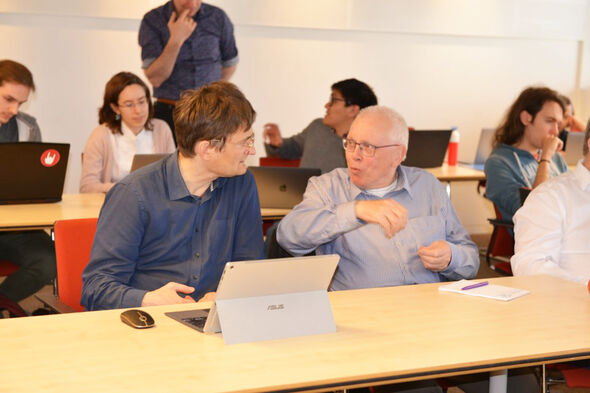
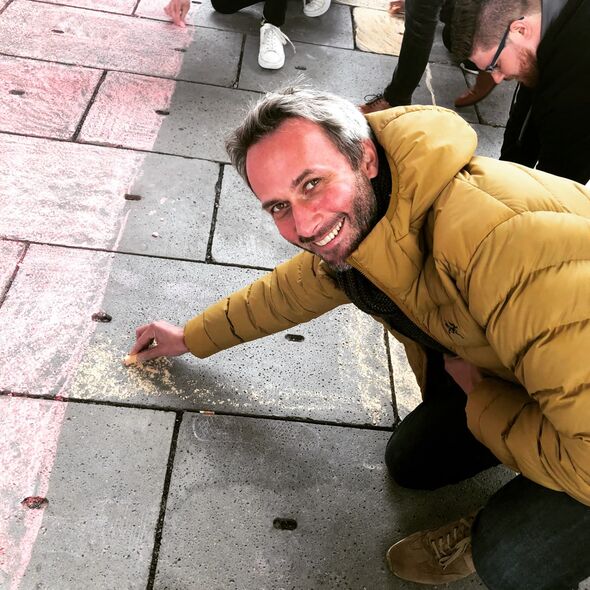
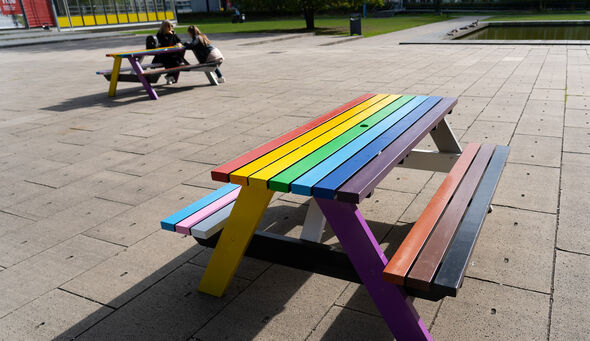
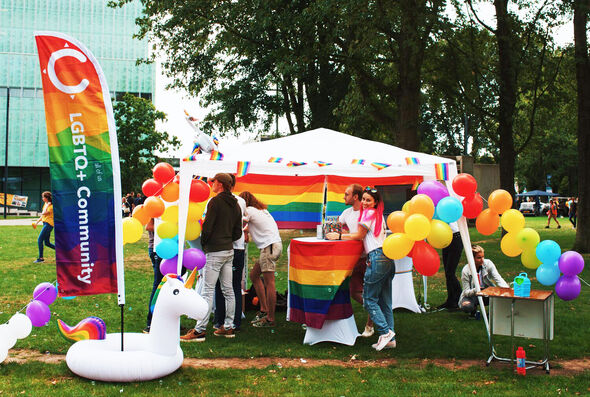
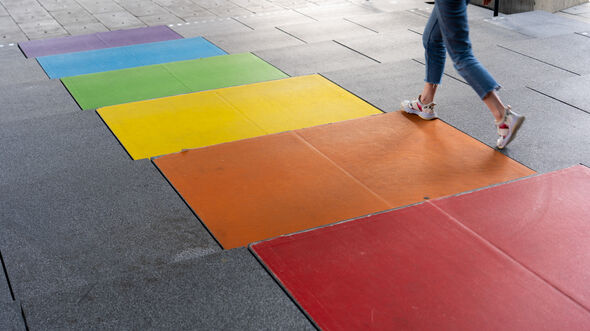
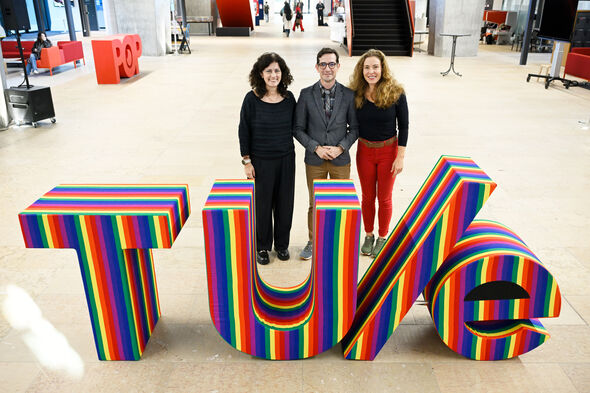
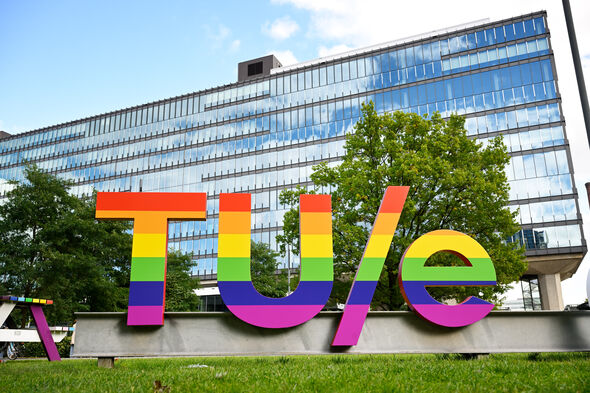
Discussion